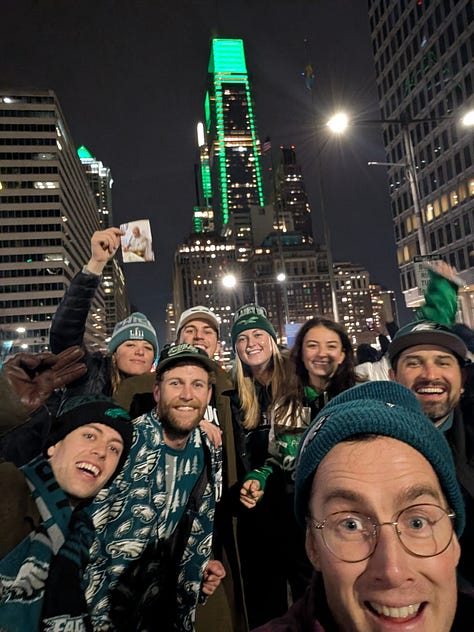Monthly Review: Joys and Sorrows in Philadelphia
Big wins, a loss, lots of administrative barrel rolls, and the nature of knowledge
Sports are a funny and fickle thing. We as a society and culture distill somewhat arbitrary rules and procedures that we treat as divine benefactions and absolute truths. We draw similarly arbitrary lines in the sand to distinguish “us” vs “the other” - lines based on geography, school allegiance, family tradition, or sometimes just the aesthetic appeal of team colors and logos - then defend these chosen distinctions with remarkable passion and conviction, as if they were embedded in our very DNA rather than adopted by circumstance or chance. We then endlessly debate and entertain ourselves at clockwork intervals with the successes, failures, and surrounding drama of the people we otherwise have no meaningful common bond with aside from perhaps geography and choice. Of course, this perpetuates yet another “us” vs “the other” in the form of those who view the physical nature of these endeavors as crude or the entire enterprise as frivolous, positioning themselves as intellectually or culturally superior to the 'masses' who find meaning in athletic competition. They of course somehow disregard the fact that all of society - the arts, education, politics, nation states themselves - is driven by the creation of arbitrary rules and the unfortunate polarization towards “us” vs “them”, and the debate and entertainment of our tribe’s successes and failures.
We wax too metaphoric. The Super Bowl was last Sunday. To the point - I am, for better or worse, a fan of the associated sport. Beyond that, I am afflicted by a very particular version of this curse and indisposition, having been born near the city of Philadelphia, which in general has optimistically been net neutral on my life, but in this case was positive in that they were in and won said Super Bowl. Moreover, I happened to be home in that city during the Super Bowl, as were nearly 40 of my extended family, and it was undoubtedly and undisputedly awesome to have that fortuitous coincidence to celebrate together with my family, my people, for the success of my chosen tribe.
Philadelphia is a city that is exceptionally sports-driven, so victory manifests in peculiar ways. Did the citizens prove that it’s possible to scale greased lamp poles? Yes. Did I have to Google why there were burning effigies of Kermit the Frog? Also yes. Did I expect or need to see men rip street posts and stoplights out of the ground and parade them around Broad Street? Probably not. It does cause me to wonder from a civic operations perspective if the city government stocks up on extra capacity in preparation for the big game. But it and many other strange and exotic behaviors exhibited by its residents are part of a unique cultural fabric that, while often mocked or misunderstood, represents a raw, unfiltered expression of communal joy and belonging.



Highs and lows, ups and downs, our joys and sorrows - all tend to come in pairs. So too here. I was present in Philadelphia not for the Super Bowl, but due to the passing of my grandfather, Louis Love Keeler Jr. He was, for lack of more articulate words, a great man. A patriarch and family man in every sense of the word, with a sprawling family of 5 children, 17 grandchildren, and 5 great-grandchildren, he was also a man dedicated to bettering his church, his community, and the world. He was a man of strong opinions (often political) said respectfully, of good times enjoyed with family and friends, and of lifelong travel, learning, and love.
Notably for those who read this particular publication, he was also a urologist, but at a more general level, a physician of a different, nostalgic, perhaps golden era. He practiced largely in the pre-EHR era - I remember vaguely the piles of paper charts in the office where he and my dad co-practiced for six years. His urologic practice was small in headcount by today’s consolidated standards, but wildly successful. He, like many doctors of the era, was an entrepreneur - he took a massive risk on new technology, the lithotripter, and was right, and benefited accordingly. He healed and helped patients but moreover did all he could to simply do good for humanity: as President of the Medical Society of New Jersey in the 1990s, he led a contentious but ultimately successful vote to support a statewide initiative to provide clean needles to drug users in the state's three most addicted cities, reasoning that preventing AIDS and hepatitis outweighed prevalent stigmas and concerns (even from his church) about enabling addiction.
I mention him simply to honor him and to remember him. I hope we as a society can find a way to share and converse in respectful discourse like he did, despite the arbitrary lines we draw between one another. I hope that medicine can find a way to take the best of his era and combine it with the advances of our digital age. I hope I can raise a family like his, do good in the world like him, and find a way to be a modicum of who he was.
Go Birds and I’ll miss you, Grandpa.
Regulatory:
AI Prescribing Bill: H.R.238, introduced by Rep. David Schweikert (AZ), would allow FDA-approved AI systems to prescribe medications and access patient records. While still in early stages without cosponsors, the bill represents a dramatic shift in potential AI authority in healthcare delivery and notably comes from a conservative representative.
Federal Infrastructure Shift: Despite traditional conservative preference for decentralized systems, the incoming administration appears poised to create the most centralized federal health infrastructure to date. This represents a notable ideological shift in healthcare data governance thinking.
HITAC Suspension: Trump administration indefinitely suspended health IT advisory committee meetings. While some see this as a policy shift, it's likely just part of broader restrictions on external communications by career employees, as HITAC is a Congressional mandate that cannot be legally dissolved.
California API Delay: California's SB-1419 requiring Patient Access APIs for all insurers was delayed to 2027 just days before implementation. Despite evidence that organizations like UnitedHealth had completed technical work, lobbying efforts successfully pushed back the requirement by several years.
Court cases:
Epic-Particle Latest Filing: Epic's reply memo in support of motion to dismiss shows increasingly aggressive positioning, directly targeting perceived weaknesses in Particle's antitrust arguments. The filing reflects competing schools of antitrust thought, with Epic employing Chicago School economic arguments while Particle leans on neo-Brandeisian market structure concerns.
RTMS v. PCC Arguments: New appellate court oral arguments suggested significant skepticism of RTMS's position in this information blocking case. Judge Heytens focused on contractual issues - since RTMS accesses data through facilities that agreed not to use bots, he questioned how this wasn't a breach "every single time." While judges showed concern for data sharing goals, their questions highlighted tension between contractual rights and information blocking rules.
Particle's Sur-Reply Request: Particle filed for permission to submit a short sur-reply after Epic argued competitors must show market exit for antitrust injury. Epic's novel interpretation of their cited Valassis case prompted Particle to seek this additional briefing opportunity before the court rules on dismissal.
Particle Gains Extra Round: Judge Buchwald granted Particle's sur-reply request, allowing them to address Epic's market exit argument. The ruling suggests enough substance to warrant additional briefing, though it doesn't indicate the judge's views on the underlying antitrust arguments.
EHRs:
Stargate and Cosmos: Oracle joined a high-profile AI initiative alongside Softbank and OpenAI, emphasizing healthcare applications. While the announcement focused on cross-institutional clinical decision support, the core functionality mirrors Epic's existing Cosmos capabilities.
Epic's Program Growth: Epic launched several initiatives expanding their network reach, including a "Blue Ribbon Program" for Payer Platform with Humana as first member. The company also added CLEAR and ten new categories to their Toolbox, signaling continued push into new market segments through platform plays.
Epic's IAS Implementation: Epic's approach to TEFCA Individual Access Services (IAS) requires patients to log into each health system after identity verification, even when records are found through the network. This implementation choice adds friction to the patient experience, as users must not only prove their identity but also maintain active portal credentials at each institution. While the architecture improves app registration and record location compared to existing methods, Epic's decision to maintain portal-based authentication creates an additional barrier since many patients lack automatically provisioned portal access.
Epic's Network Product Strategy: Epic's continued expansion through Health Grid products represents a systematic push to dominate non-provider healthcare segments. With Payer Platform, Aura, Discovery and other offerings, Epic is leveraging its provider network dominance to create new network effects in payer, lab, and clinical trial markets.
Oracle, Wikipedia, and The Art of Talking Shit : Oracle published another notably aggressive corporate blog post, this time targeting Wikipedia edits about Seema Verma and criticizing Epic. While the post focuses on investigative claims about Wikipedia editing patterns, it sidesteps Oracle's own opportunity to differentiate through better APIs, cross-organizational workflows, or more patient-friendly TEFCA IAS implementations. The contrast between Oracle's sharp rhetoric and their current market execution suggests energy might be better spent on tangible interoperability proof points than competitor criticism.
This perspective seems to be shared universally, as both Epic and Cerner Reddit communities ridiculed and criticized the post, although some believe it to be a distress signal to and clumsy appeal for help from the Trump administration
Industry Analysis:
AI Scribe Market Evolution: Analysis shows AI scribes won't commoditize as previously thought, with market segmentation driven by varying integration needs across organization sizes and specialties. The technology's ceiling isn't just note-taking but full workflow automation, requiring deep EHR integration that will maintain market differentiation.
KLAS Annual Report Trends: The 2024 KLAS rankings show stability in major EHR categories (Epic, MEDITECH, athenahealth) but highlight market fragmentation in specialties. Notable disruptions include Elation Health winning small EHR category and Abridge leading in ambient clinical documentation. The rankings reveal an ongoing interoperability challenge - many popular specialty EHRs (like SIS, Wellsky, MatrixCare) lack certification for basic exchange capabilities, creating significant data sharing barriers in specialty care.
Cross-industry Comparisons:
Healthcare's Jevon's Paradox: The social networks were lit up by DeepSeek takes. While I had nothing unique to say there, the related Jevon’s Paradox is worth examining. As healthcare processes become more efficient through technology, total volume often increases rather than decreases. This economic principle, borrowed from energy markets, manifests in patient messaging, telemedicine utilization, and health information exchange volumes.
Historical Misinformation Patterns: Today's concerns about misinformation echo historical patterns from Ancient Rome's propaganda coins through medieval rumor networks to yellow journalism. The key difference isn't the existence of misinformation but its velocity and scale through digital networks. With AI making content creation frictionless and human confirmation bias unchangeable, the solution lies not in restricting information flow but in creating better ideas that naturally outcompete false narratives - much as scientific thinking gradually displaced superstition.
The Knowledge Barbell: An emerging pattern shows knowledge distribution splitting into two extremes: a public "marketplace of ideas" where perspectives compete to become dominant frameworks, and private "knowledge fortresses" where organizations guard valuable insights. This dynamic, accelerated by AI and frictionless distribution, has implications for healthcare data sharing - organizations must choose between protecting competitive advantage through data silos or participating in network effects through reciprocal exchange. The pattern suggests lasting value will come from building on shared knowledge rather than maintaining artificial scarcity.
Other News:
Tempus Launches Olivia: Tempus AI entered the consumer market with Olivia, a personal health record offering integration with patient portals and device data. The $12.99/month price point raised industry eyebrows, though the play may be more about data acquisition than direct monetization.
External Media:
AI Rounds: AI is so hot right now, so my friends at Innovaccer got together a few smart people (Jennifer from Milliman, Alya from Datavant, and Anil) and myself to work through the biggest talking points. We’ll be doing this semi-regularly, so send in your topics and questions!
Posts I Liked:
SMART Development Tools (Scott Rosignol): A new open source Python repository for SMART on FHIR integration was released with sample keys and basic implementation patterns. The project aims to lower the barrier to entry for SMART app development, with plans to add JWKS support and CDS Hooks capabilities.
AI Dataset Curation (Sam Seymour): Traditional healthcare dataset creation has been bottlenecked by manual curation and rigid collection protocols. Companies are now exploring using domain-specific LLMs to transform messy, multimodal healthcare data (with varying languages, formats, and identifiers) into structured datasets, potentially accelerating AI development cycles.
Industry Report (Define Ventures): VC doesn’t always add value, but Define really does the industry a service with this report. shows health tech companies now reaching 2-3x the revenue scale of previous exits while building more efficiently through AI and automation. The report highlights increasing enterprise buyer readiness for new solutions compared to five years ago.
Medical Imaging Platform Evolution (Sam Seymour): Traditional imaging platform companies are increasingly becoming accidental platform builders, creating complex integration ecosystems while trying to solve narrow problems. The pattern reveals how healthcare technology companies often expand beyond their initial focus, leading to a paradox where everyone must integrate with everyone else, resulting in many half-developed platforms that aren't truly enterprise-ready.






Great article - congrats to Grandpa Keeler for a high impact life - disappointed there was not reference to the halftime show and its associated 4D level of cross cultural references that to date are still being discovered - would love to see an analysis of your top 5
Please follow these